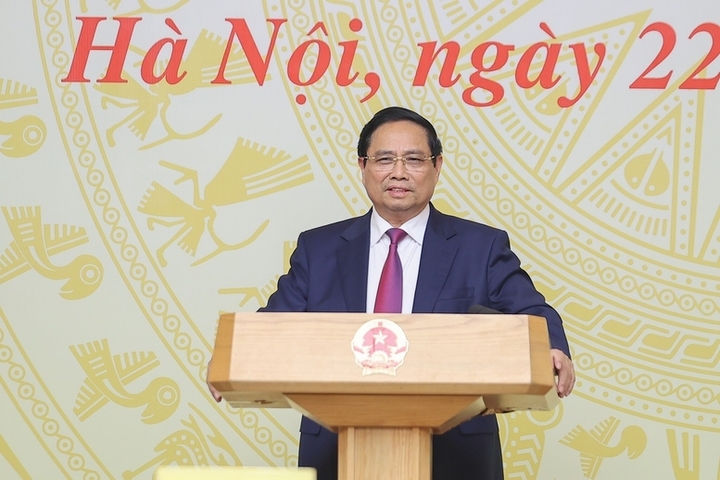On August 22, at the conference to conclude the 2024-2025 academic year and deploy tasks for the 2025-2026 academic year, Prime Minister Pham Minh Chinh requested that the Ministry of Home Affairs coordinate with the Ministry of Education and Training and local authorities to inspect the recruitment of teachers from 2022-2026. He also instructed them to review and propose supplementary staffing until 2030 to address the current shortage of teachers, which stands at over 102,000 across all levels of education. Meanwhile, around 60,000 allocated positions remain unfilled. The shortage is particularly acute in preschools and primary schools, especially in remote, border, and island areas.
Emphasizing the principle of “where there are students, there must be teachers,” the Prime Minister stressed, “There must not be a lack of schools, classrooms, teachers, food, or clothing for students.”

Prime Minister Pham Minh Chinh outlines the limitations, shortcomings, and difficulties facing the education sector. (Photo: VGP/Nhat Bac)
At the conference, the head of the government affirmed that education is the country’s top policy, and that people are the center, the driving force, and the goal of national development. The 2024-2025 academic year witnessed positive changes in educational quality, digital transformation, infrastructure, and teacher development.
For the 2025-2026 academic year, the education sector will continue to implement comprehensive solutions: deploying digital transcripts and diplomas nationwide, promoting preschool education for children aged 3-5, making English the second language in schools, building boarding schools in border communes, and strengthening human resources training in key areas such as AI, semiconductors, and green economy.
The government also plans to increase the education budget for 2026 to a minimum of VND 630 trillion, an increase of more than VND 134 trillion compared to 2025, to serve the goals of fundamentally renewing education and training.
Looking ahead, the Prime Minister noted that the context is expected to remain complex and unpredictable, with challenges outweighing opportunities. The education sector is faced with the urgent need to innovate and develop breakthrough solutions to overcome limitations and contribute significantly to the success of the Party and the State’s new policies, providing a solid foundation for the country to enter a new era.
Based on the achievements and practical experiences in directing and managing the sector, the Prime Minister suggested that the Minister, the leadership team of the Ministry, and the entire education sector continue to focus on effectively implementing the guiding principle: “Students and pupils are the center and the subject – Teachers are the driving force – Schools are the support – Families are the anchor – Society is the foundation.”
The Prime Minister also highly appreciated the motto of the Party Committee of the Ministry of Education and Training: “Discipline – Creativity – Breakthrough – Development”. The Party Committee also set out orientations, tasks, and solutions for the new term of 2025-2030 with 8 key focuses. These are very appropriate and accurate, and they need to be thoroughly implemented in a timely and effective manner across the sector.
“Vietnamese Family Businesses Can Be the Next Samsung, Gucci, or Mittelstand with Transparent Governance”
The young entrepreneur believes that family-run businesses need to break free from the “informality trap” to go global.
Mr. Tran Le Nguyen: Kido Harnesses the Power of AI for Round-the-Clock Sales, Transcending the Need for KOLs and KOCs
“The leadership at Kido Group attests to the power of their digital transformation strategies, claiming a remarkable 70% savings in time and costs compared to traditional sales and marketing methods. This forward-thinking company is revolutionizing the industry with its innovative approach, harnessing the potential of technology to streamline processes and achieve unprecedented efficiency.”




















